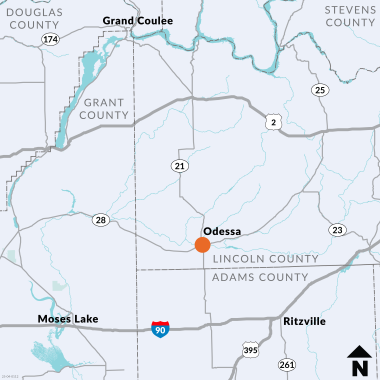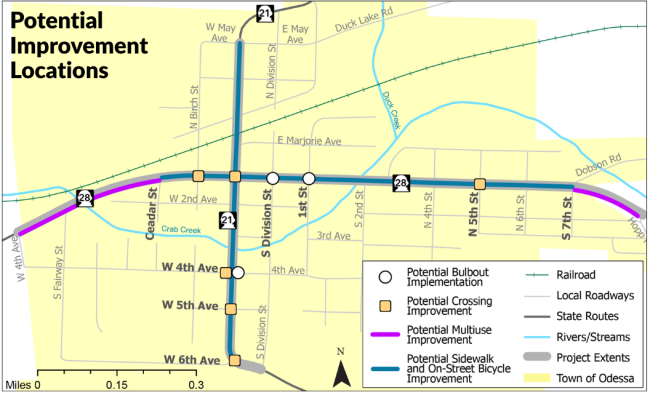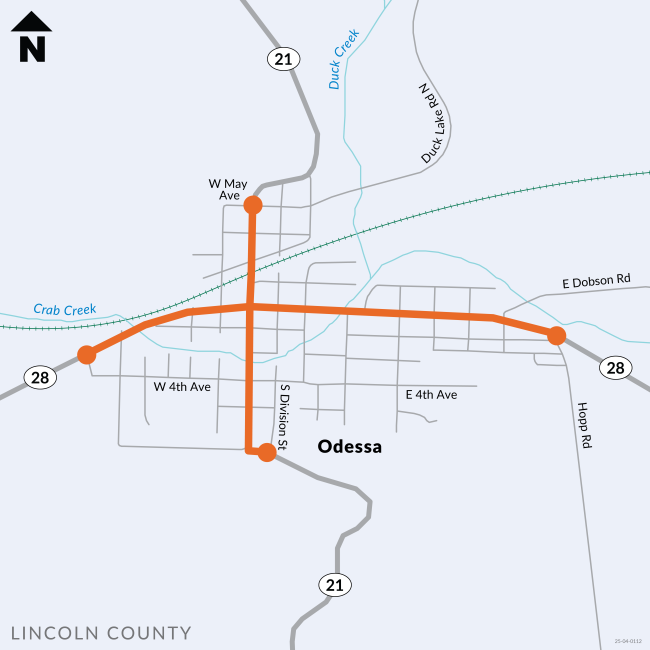Project overview
This project will rehabilitate both SR 21 and SR 28 within the city limits of Odessa in Lincoln County. The roadway is past its expected lifespan and due for replacement. Along with repaving the roadway, complete streets will be used to look at active transportation within the city limits.
What to expect
This project is in the pre-design phase to identify, select, and begin the design of the necessary Complete Streets strategies to implement as part of a paving project for this corridor. The addition of Complete Streets strategies to the paving project aims to improve the active transportation environment along and across the project corridors.
Pre-design is expected to continue through fall 2025, after which full design will occur from late 2025 to early 2027. This project will be delivered using the Design-Bid-Build process, with construction anticipated to begin in the summer of 2027. This schedule is preliminary and may change depending on the results of the pre-design phase.
Upcoming engagement opportunities
The pre-design phase of the project will include opportunities for the public to participate in this process. More information about future opportunities will be provided in this section of the webpage as details become available. For more details on Complete Streets, refer to the FAQs under the Related Links tab.
Project location map for the town of Odessa Complete Streets and paving.
State Routes (SR) 21 and 28 within the town of Odessa have been identified as needing the pavement rehabilitated to preserve the roadway structure. The original scope of this project involved rehabilitating the existing pavement with a hot mix asphalt (HMA) pavement and upgrade basic safety features within the project limits to maintain safe highway operations.
In 2022, Move Ahead Washington was passed by the Washington State Legislature, which included a requirement for WSDOT to incorporate principles of Complete Streets into transportation projects with an estimated budget greater than $500,000 and starting design on or after July 1, 2022. To aid in the implementation of this requirement, WSDOT established a Complete Streets process that first screens all programmed projects for Complete Streets applicability and subsequently provides a planning and conceptual design phase – known as pre-design – and target outcomes for projects that are required to incorporate Complete Streets. More information about the Complete Streets requirement and WSDOT’s implementation process is available on WSDOT’s Complete Streets page.
The Complete Streets screening process found the Town of Odessa paving project for SR 21 and SR 28 to require implementation of the Complete Streets requirement. Complete Streets is expected to be implemented on SR 28 from 4th Avenue to Hopp Road and from Division Street to May Avenue on SR 21. These extents may be adjusted as the project progresses. A pre-design phase has been initiated to conduct this analysis and identify the preferred Complete Streets implementation along and across the corridor. The pre-design phase will include coordination with local and regional jurisdictions, identify any Complete Streets needs, community engagement, development and selection of preferred Complete Streets alternatives and documentation.
Community engagement summary and results to date
The WSDOT project team enjoyed the opportunity to connect with the Odessa community in several ways this past spring. We hosted a project booth at the Spring Fling event on April 26, sent a community-wide mailer about the project, collected input through a Spring 2025 online survey, and hosted a public workshop on May 8. These efforts provided valuable insights into where and why people walk, bicycle, and roll along and across the corridors, including where they tend to avoid. Feedback received guided the development of the strategies being shared for further input.
The Public Workshop was held on Thursday, May 8, 2025, from 5:00 p.m. to 6:30 p.m. at Odessa High School’s Multipurpose Room. A total of 13 individuals participated in the hybrid workshop. The primary goal was to inform attendees about the project and the Complete Streets approach, while also gather input and insights. Key objectives included collecting feedback on preliminary concepts (such as different bike lane configurations), identifying priority intersections and crossings, learning about large truck traffic concerns, and understanding participants' experiences walking, bicycling, and rolling along and across the corridors.
More updates will be available in September.



